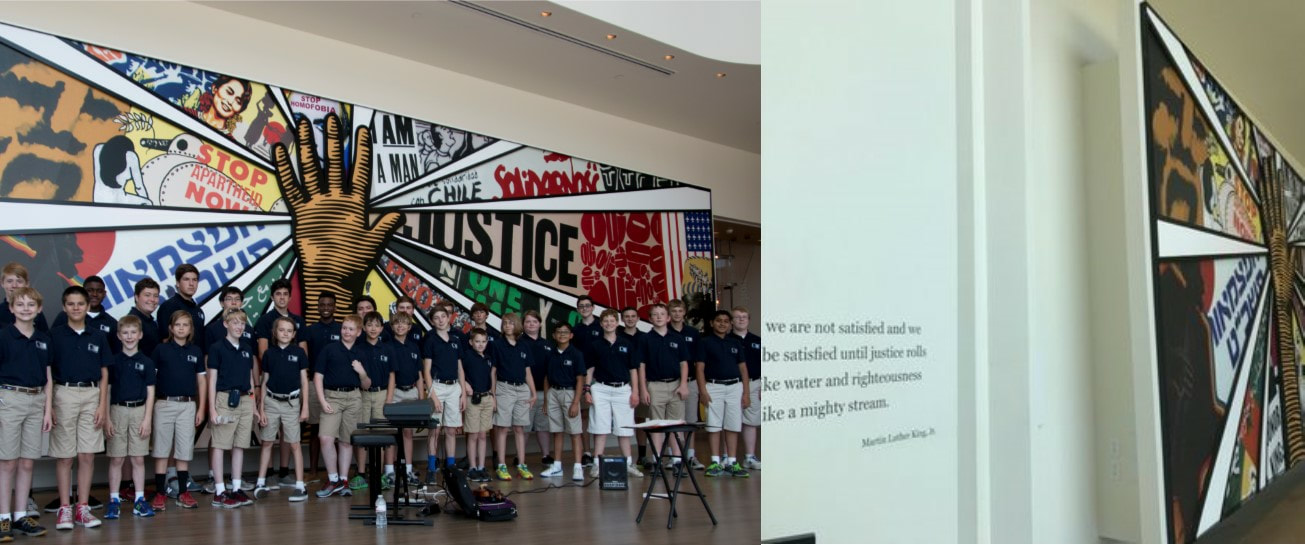|
Over the course of sixteen seasons with the Chattanooga Boys Choir, I have had many “favorites” – performances that have been artistically stunning, travels that have been eye-opening, and several opportunities to watch boys grow into musically mature and intellectually curious young men. My life has been enriched many times over by the boys’ generous sharing of themselves in rehearsal and performance, as they create a wonderful artistic product that is truly greater than the sum of their parts.
One relatively recent “favorite” occurred during the choir’s summer tour of 2016, when we presented a Civil Rights-themed program in the Civil Rights museums of Memphis TN, Birmingham AL, Montgomery AL, and Atlanta GA. While preparing the repertoire for our travels, I shared several stories about those who faced opposition and overcame adversity during the Civil Rights Movement, leading our nation toward the prized goal of equality. The conversations this sparked with the boys were incredible – they shared their admiration of these great leaders of the past, recognized those who were at work today with such efforts, and commented on how they themselves might be agents of change not only as leaders of tomorrow but as active youth today in their families, schools, and communities. One song that captured the essence of their discussion was “Like a Mighty Stream” by Rollo Dilworth, a setting of a portion of Rev. Dr. Martin Luther King, Jr’s I Have a Dream speech where, paraphrasing the book of Amos, Dr. King states: “We are not satisfied and we will not be satisfied until justice rolls down like waters, and righteousness like a mighty stream.” So remarkable is this quote, it is etched into the memorial fountain at the Southern Poverty Law Center in Montgomery AL and in the entryway of the National Museum of African American History and Culture in Washington DC. Hearing a song of such gravity performed by these talented young people provides both hope and caution, as we balance the tensions of optimistic youth with present realities, casting both light and a pall on the shared hope that we are leaving our children with a world better than the one we inherited. As the choir performed the piece in the bustling lobby of the National Center for Civil and Human Rights in Atlanta, I was struck by this text after touring this remarkable museum, especially given Dr. King’s storied career in Atlanta. While the boys were singing “Like a Mighty Stream,” I noticed some high school-aged students gesturing and pointing in the direction of the choir. A bit unnerved, I tried to ignore them and identify which of the boys had captured their attention, assuming it was not for a good reason (the boys will tell you of the importance I place on remaining focused on the performance/task at hand!). As I glanced inquisitively at the left edge of the choir, I was able to identify the subject of the audience members’ attention. Over the shoulders of those boys, etched into the wall just behind where they were performing, were the same words from Dr. King that we had been singing for the last several minutes – “Let justice roll, like a mighty stream…” In a rare break in character, in front of a lobby filled with tourists and audience members, I asked the boys to turn around and view the words after they finished the piece. An interesting mixture of glee and gravity came over the choir, as they realized more fully the impact of these words and the meaning that was added when we presented it together in our community of song. The role of music in the Civil Rights movement and other historic moments and movements throughout history is well-documented. Singing brings people together in an instant, further unifying their collective ability to bring about change and – literally and figuratively – giving voice to their concerns, outrage, hopes, and dreams. As a form of collective protest and of personal expression, music allows people to communicate for, as Hans Christian Andersen identifies, “when words fail, music speaks.” Participation in the Chattanooga Boys Choir is so much more than preparing repertoire and learning proper singing technique (though we’re certainly proud of those as well!). Singing in the choir is an exercise in effort and humility, grit and artistry, excellence and community that transcends the lone effort of any individual. Numerous studies from recent years espouse the health benefits of singing, the increased neural activity observed in music-making, and the accelerated learning of the musically-oriented mind. However, I am reminded as we observe Rev. Dr. Martin Luther King, Jr. Day that being a part of the choir allows tremendous growth of the heart. As the boys breathe life into a variety of pieces from different cultures, languages, time periods, and perspectives, and as they work side-by-side with others to create beautiful moments which can never be replicated, they are participating in something that makes them not just better singers and musicians, but provides them with a foundation to be outstanding people and citizens. While “Aha!” moments of turning around and seeing the lyrics of a song you are singing emblazoned on the wall behind you are rare, it is not uncommon for the meaning and the message of such pieces to make their way from the boys’ voices and ears into their minds and hearts. Already this semester, we have explored the resiliency found in the African-American spiritual, the power of raising one’s voice in song, and celebrated the importance of community in Swahili (Sisi Ni Moja / “We Are One”). Thank you for allowing your chorister to participate in this exercise and find strength with one another as they lend their voice to the choir. “We must learn to live together as brothers or we will perish together as fools.” Dr. Martin Luther King, Jr. Gratefully, Vincent Oakes Artistic Director Comments are closed.
|
Archives
December 2019
Categories |

 RSS Feed
RSS Feed